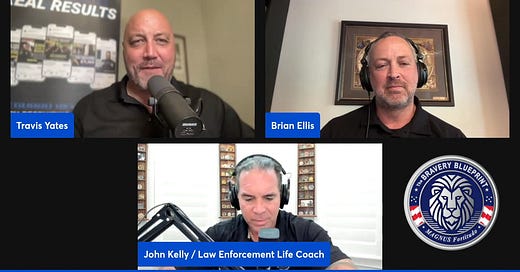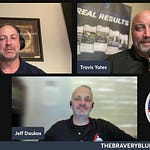In recent years, the conversation around mental health and self-care in law enforcement has gained traction. In this episode of The Bravery Blueprint podcast, we talk with John Kelly, The Law Enforcement Life Coach.
John Kelly's Journey in Law Enforcement
John Kelly's career in law enforcement spans three decades, during which he served in one of the largest sheriff's departments in the United States. His extensive experience led him to realize that many officers were struggling not with police work, but with personal issues that were affecting their performance and well-being. This realization sparked a passion for providing holistic support to first responders.
Kelly emphasizes that effective leadership begins with self-care. "You can't lead people if you can't lead yourself," he states. He believes that officers need to be trained not only in high-liability skills but also in personal development, relationship building, and self-care practices. This shift in focus is essential for reducing the alarming rates of suicide and mental health issues in the profession.
The Need for Holistic Approaches
Kelly advocates for a comprehensive approach to training officers that encompasses various aspects of life, including:
Relationships: Building strong connections with family and peers is crucial for mental health.
Culture: Fostering a supportive work environment can significantly impact officers' well-being.
Finances: Financial stress is a common burden that can lead to mental health struggles.
Physical and Mental Health: Addressing both physical fitness and mental wellness is vital for overall health.
Kelly notes that many agencies focus solely on making the department better, often neglecting the individual officer's needs. This approach can lead to burnout and a lack of fulfillment in both personal and professional lives.
Creating a Culture of Caring
At the core of Kelly's philosophy is the belief that caring for oneself is foundational to caring for others. He argues that leaders must model self-care and provide support for their officers to do the same. This approach creates a culture in which officers feel valued and understood.
Kelly challenges the traditional punitive measures often employed in law enforcement, advocating for a more compassionate approach to discipline. He suggests that understanding the reasons behind an officer's behavior can lead to more effective interventions and support.
Empowering Officers Through Coaching
Coaching plays a crucial role in empowering officers to take charge of their own lives. Kelly emphasizes that rather than being the "champion" for others, leaders should guide individuals in discovering their paths. This empowerment fosters resilience and personal growth, ultimately benefiting the entire organization.
As Kelly points out, the journey toward improvement begins with the individual. By taking responsibility for their well-being, officers can influence their peers and create a ripple effect throughout the department.
Conclusion: The Path Forward
The insights shared by John Kelly highlight the urgent need for a shift in the law enforcement culture. By prioritizing self-care, fostering strong relationships, and creating a supportive environment, agencies can significantly improve the mental health and well-being of their officers.
As we move forward, it's essential for leaders to recognize their role in shaping a culture of care. By investing in the well-being of officers, we not only enhance their lives but also improve the communities they serve. The journey toward a healthier, more supportive law enforcement environment starts with each individual taking responsibility for their own well-being and encouraging others to do the same.
Travis Yates is the co-author of “The Courageous Police Leader” and has been training risk management and leadership for over two decades that have spanned thousands of students and 48 states. After dedicating over 30 years to the law enforcement profession, he is now working full-time consulting and training law enforcement leaders across the country.
Brian Ellis is a retired law enforcement lieutenant with over 25 years of service. He is the co-author of “The Theory of Magnus Ovea”, and his dedication to the theory of leadership led him to the National Command & Staff College, where he and his colleagues launched MAGNUSWorx, an education and data analytics platform dedicated to peak performance and wellbeing. Brian is a speaker, coach, and trainer for government and private organizations, dedicated to promoting leadership, high-performing teams, and providing others with actionable information for personal preparedness and resilience. His work has been featured in various media outlets, including numerous articles, book chapters, and podcasts.













Share this post